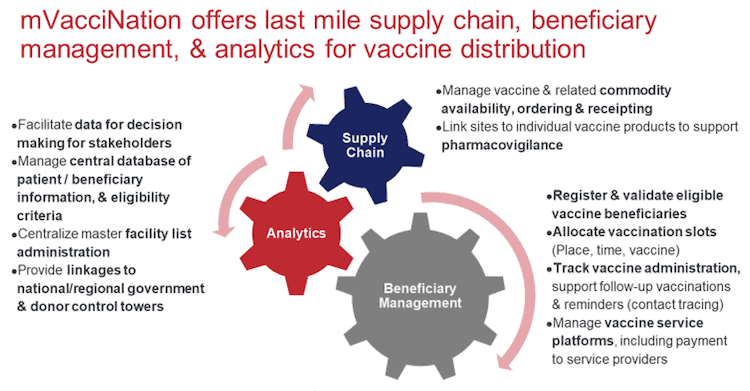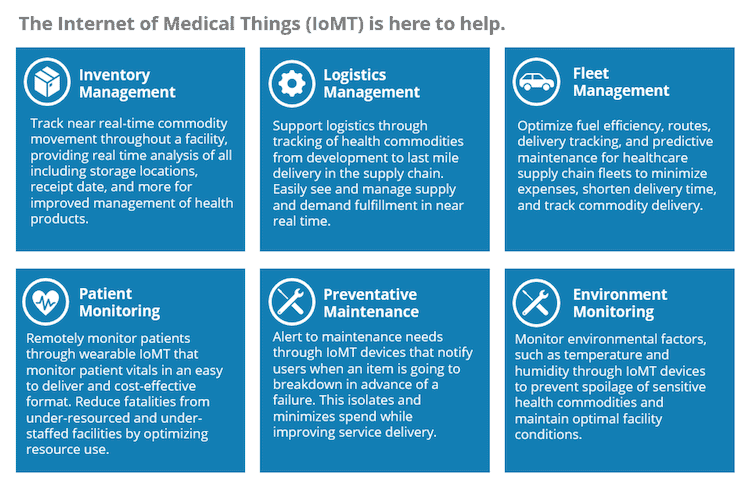Improving COVID-19 Vaccine Distribution Around the World: Leveraging Partnerships and Technology to Optimize Medical Supply Chains
Improving COVID-19 Vaccine Distribution Around the World: Leveraging Partnerships and Technology to Optimize Medical Supply Chains
by Wade Warren and Marian W. Wentworth
This post originally appeared on the Next Billion website.
As the world takes action to overcome the COVID-19 pandemic in low- and middle-income countries (LMICs), we are reminded of the effectiveness of vaccination for many routine childhood diseases. According to the World Health Organization, routine vaccination prevents 4 to 5 million deaths each year, a testament to the success of vaccine programs and the commitment of stakeholders, including GAVI, USAID and country governments.
However, the prospect of delivering the COVID-19 vaccine in LMICs is more daunting than childhood vaccine delivery, mostly because the target population for vaccination is novel and the systems are not yet developed to efficiently accomplish adult immunization. In addition to ensuring the developed vaccines are appropriate for specific LMIC contexts, the distribution system — the supply chain — must be established, local medical policies created, health systems improved to include adult immunization, and community trust and support cultivated. Ad hoc programs are not enough, because countries will need to reach the same beneficiaries several times to facilitate vaccines that require two doses, as well as to administer future boosters and potentially conduct annual vaccination.
Adding to the complexity, demand will outweigh supply for the foreseeable future, perpetuating the need for phased delivery and beneficiary eligibility validation. Site management is also more complex. Identifying local resources, such as facilities, human resources and personal protective equipment, is challenging given the burden health systems have dealt with since the beginning of the pandemic. Moreover, site selection is dependent on the requirements of the chosen vaccine (e.g., vial size and dosing, number of doses, storage, etc.) and the site’s ability to reach a predetermined volume of beneficiaries in a specific timeframe.
Typically, the obstacles to optimizing vaccine distribution are relatively consistent, including:
- Insufficient systemized patient record keeping
- Lack of formal patient outreach and eligibility validation
- Limited distribution infrastructure and cold chain storage capability
- Challenges of reaching all the way to the last mile
In our separate experience at Management Sciences for Health, a global health nonprofit, and Deloitte, a globally focused professional services firm, we have seen directly how some of these key challenges can be solved by technologies that facilitate supply chain monitoring, site-level information collection, beneficiary management and data analytics. These are solutions broadly utilized by both of our organizations.
While diverse options are available for improving vaccine distribution in LMICs, our experience shows that concentrating on the following four areas leads to greater success:
- Electronic record-keeping
- Improved patient outreach and eligibility verification using mobile apps
- Monitoring cold storage integrity throughout the supply chain
- Optimizing distribution performance at the last mile
Below, we’ll explore how our partners have focused on these four areas to overcome common obstacles to vaccine distribution, using tried-and-proven solutions that leverage their knowledge and momentum.
Electronic Recordkeeping
Like epidemics and pandemics, natural disasters take their toll in multiple, often unexpected ways. Some of the things they damage, like buildings and roads, can be rebuilt. Others, like lost records, cannot be recreated. For instance, in March 2019, Cyclone Idai devastated the area surrounding Beira, Mozambique. Amidst the death and destruction, thousands of patient records were lost.
Consider how electronic patient records could be lifesaving in situations like the one in Mozambique. To address that issue, Management Sciences for Health designed RxSolution, with funding from USAID, to manage pharmaceuticals and medical supplies — from procurement and demand planning to the dispensation of medicine to patients. To that end, RxSolution electronically manages patient information, including prescriptions and referrals. This solution enables pharmacists to track, analyze and manage medication stock and storage, helping provide medicines to patients when and where they need them. In addition, RxSolution provides clinicians with the ability to track where medications are being dispensed, to ensure patients are receiving optimized care.
RxSolution has been adopted widely by health authorities in South Africa and Uganda. In fact, in South Africa, there are about 550 active sites, ranging from small clinics to large hospitals. Over the next year, that number is expected to reach almost 700. Likewise, teams in Uganda are working to implement the solution in an additional 800 facilities during the summer of 2021, with the possibility of further extension throughout the year.
Improving Patient Outreach And Eligibility Verification Using Mobile Apps
Imagine if patients could get information related to COVID-19 vaccine availability at the touch of a button — or if providers could easily assess the stock of syringes and other commodities to determine site readiness for vaccine distribution. mVacciNation offers both of these benefits. Using an app accessible by tablet or phone, key information is delivered to providers and participants across the supply chain. At the site level, healthcare providers can use the mVacciNation beneficiary management platform, which supports patient registration and eligibility validation, scheduling, linkage to electronic medical records, patient follow-up and reminders via SMS text messages. For supply chain decision-makers, mVacciNation provides information regarding vaccine availability, cold-chain monitoring, electronic ordering of vaccines, syringes and related commodities and more.
But mVacciNation doesn’t work alone. It is powered by a mobile solution partnership with Right to Care, Mezzanine and Vodacom. In February 2021, South Africa began using mVacciNation to support national COVID-19 vaccine distribution. In addition, Mozambique, Tanzania and Nigeria used mVacciNation to support the roll-out of childhood vaccinations in partnership with GAVI, USAID, GSK and others.

Monitoring Cold Storage Integrity Throughout The Supply Chain
A key challenge with vaccine delivery is the lack of reliable cold storage, which puts medical supplies at risk of degradation or spoilage. Existing distribution processes are designed to prevent commodity degradation — however, they are often unevenly applied across the supply chain. An emerging solution to this problem involves the use of Internet of Things (IoT) sensors to monitor the efficacy of refrigeration in near-real time throughout the cold chain, to improve vaccine quality and delivery. Around the world, Deloitte has been working with its partners to implement remote sensors, which quickly alert providers to fluctuations in the environment, rising temperatures within refrigeration units and malfunctioning equipment. The information provided by the devices is visualized through a control tower application or sent as text alerts directly to drivers and medical personnel.

USAID and other organizations have recognized the importance of this sort of end-to-end temperature monitoring. USAID’s Project Last Mile taps into the Coca-Cola Company’s established and effective cold chain solutions and refrigeration technologies in last-mile supply chain delivery. The program leverages Coca-Cola’s proven logistics capabilities to deliver medical commodities to communities. For example, Coca-Cola is a leader in IoT-enabled “smart refrigerators” that report on malfunctions and temperature fluctuations, while also providing visibility into exactly where goods are located.
Optimizing Distribution Performance at the Last Mile
Several countries have optimized their operations for managing last-mile distribution. Mozambique has embraced a USAID program called Last Mile Supply Chain, which relies on a combination of international fourth-party logistics (4PLs) providers and local, in-country third-party logistics (3PLs) organizations to manage distribution on a regular monthly schedule to predetermined health facilities in the provinces.
Technology adoption can materially enhance this efficiency. Fleet monitoring systems — usually employed by 3PLs and 4PLs — provide alerts in both real-time (delivered when preset parameters are reached) and passively (with information available on demand). This can improve driver compliance around vehicle performance, route adherence, time adherence and on-time delivery. This monitoring allows logistics organizations to allocate vehicles more optimally to complete their delivery missions.
Improving this sort of operational performance can strengthen national health systems. That’s what happened in Kenya, where USAID worked with the Kenyan government to create the Kenya Medical Supplies Agency (KEMSA) Support Program in 2011, with Deloitte serving as the lead implementing partner. The project helped KEMSA deliver on its mandate by emphasizing leading practices, such as distribution route optimization, contract renegotiations and transportation service-level agreements. These implementations led to real-world results, including: the expedited procurement and repositioning of stock, which avoided the expiry of 1.7 million units of medical supply; a 16% improvement in on-time delivery; and a 33% improvement in transportation reliability.
Improving fleet performance and efficiency is important, but outsourcing activities such as distribution to the private sector provides additional benefits as well. It creates local employment; it allows the contracting party to pay only for services that meet their goals; and it places the responsibility for issues like vehicle utilization, ownership, insurance and maintenance on contractors that specialize in these services.
While innovative technology is important, on a more fundamental level, it’s collaborative partnerships, attentive communications and strong health systems that create the foundation for sustainable success in distributing the COVID-19 vaccine and other vital health services. As the concepts and technologies discussed above evolve from proven to scalable, the ongoing adoption of these approaches can make a substantial and positive impact on LMICs’ medical supply chains, with benefits that will long outlast the pandemic.
Wade Warren is the Chief Strategy Officer for International Development at Deloitte Consulting, and Marian W. Wentworth is President and Chief Executive Officer of Management Sciences for Health (MSH).